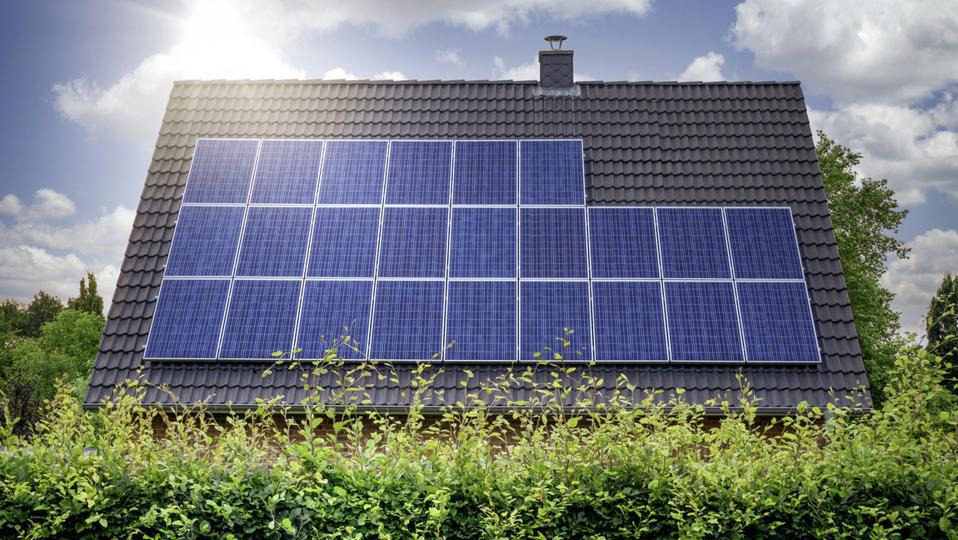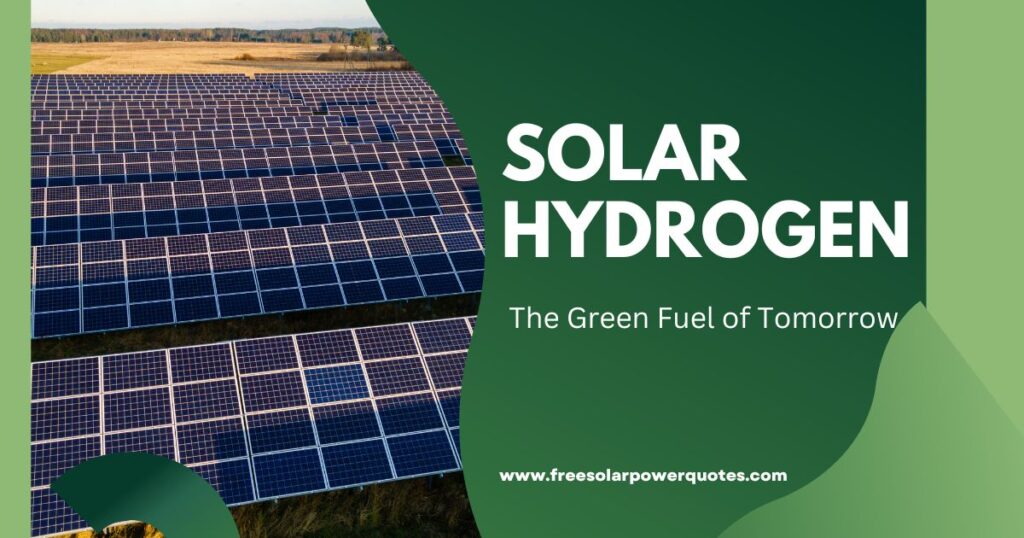As the globe continues to face the problems posed by climate change, there has been a growing interest in clean and sustainable energy sources in recent years. The use of hydrogen solar panels or solar panels with the ability to make hydrogen directly to convert solar energy into hydrogen energy is an attractive possibility. In this article, we’ll discuss solar hydrogen in detail.
What is Solar Hydrogen?
Solar hydrogen refers to the process of generating hydrogen gas from solar energy. This can be achieved through various methods, including using solar panels to power electrolysis systems that split water molecules into hydrogen and oxygen. Another approach is using solar panels specifically designed to generate hydrogen directly.
Production of Hydrogen Energy from Solar Energy
The production of hydrogen energy from solar energy is an attractive option for several reasons. First, hydrogen is a clean and versatile energy carrier that can be used in various applications, from powering vehicles to providing electricity for homes and businesses. Second, solar energy is abundant and renewable, making it an ideal power source for hydrogen production.
The process of producing hydrogen energy from solar energy typically involves two steps. The first step is to generate electricity from solar panels. Water is electrolyzed to produce hydrogen and oxygen using this power source. The hydrogen gas can be stored later, while the oxygen can be released into the atmosphere.
Another approach is using solar panels specifically designed to generate hydrogen directly. When exposed to sunshine, water is divided into hydrogen and oxygen by a photocatalyst substance in these panels. The technique of photoelectrochemical water splitting is still in its infancy, yet it holds great potential.
Hydrogen Solar Panel
A hydrogen solar panel is a type of solar panel that is designed to generate hydrogen directly. These panels use a photocatalyst material, such as titanium dioxide, to split water molecules into hydrogen and oxygen when exposed to sunlight.
One of the advantages of hydrogen solar panels is that they do not require any external power source, as they generate hydrogen directly from sunlight. This makes them a self-contained and portable source of clean energy. They can be used to power remote locations or provide backup power during emergencies.
Hydrogen solar panels are still in the early stages of development and are not yet commercially available. However, researchers are working to improve their efficiency and reduce cost, intending to make them a viable option for widespread use.

Hydrogen from Solar Energy
Solar-generated hydrogen could be a game-changer in the fight against climate change. The production of hydrogen gas from solar energy is a clean and sustainable process that does not produce any greenhouse gas emissions. Hydrogen is a completely sustainable fuel because it has no emissions and produces only water as a by-product of its combustion.
Hydrogen can be used in various applications, from powering vehicles to providing electricity for homes and businesses. It is easy to store and move, making it a flexible energy carrier.
Hydrogen Generation Solar
Hydrogen generation solar refers to the process of generating hydrogen gas from solar energy. This can be achieved through various methods, including using solar panels to power an electrolysis system or using hydrogen solar panels that generate hydrogen directly.
One of the challenges of hydrogen generation solar is the efficiency of the process. Electrolysis systems are typically only around 70% efficient, meaning that a significant amount of energy is lost when splitting water into hydrogen and oxygen. However, new technologies are being developed that aim to improve the efficiency of electrolysis systems and reduce their cost.
Conclusion
Solar hydrogen has the potential to be a game-changer in the transition to a low-carbon economy. It offers a clean and sustainable source of energy that can be used in a wide range of applications, from powering vehicles to providing electricity for homes and businesses.
While hydrogen solar panels are still in the early stages of development, the technology is rapidly advancing, and researchers are working to improve their efficiency and reduce their costs. Electrolysis systems are currently the most widely used method for producing hydrogen from solar energy, but they are not as efficient as they could be. New technologies, such as the use of solid oxide electrolysis cells, are being developed to improve electrolysis systems’ efficiency and make them more cost-effective.
The production of hydrogen energy from solar energy is a promising avenue for achieving a sustainable and clean energy future. It can potentially reduce our reliance on fossil fuels and significantly reduce greenhouse gas emissions. As technology advances and becomes more widespread, we can look forward to a future where solar hydrogen plays a central role in meeting our energy needs.
In conclusion, hydrogen from solar energy is a promising solution to the challenges posed by climate change. Clean, renewable, and adaptable, it has the potential to transform how we generate electricity for homes, businesses, and transportation networks. As we continue to invest in research and development, we can look forward to a future where solar hydrogen plays a critical role in creating a more sustainable and equitable world.
Ready to go solar? Don’t wait any longer – visit freesolarpowerquotes.com now to receive a personalized quote and start saving on your energy bills!
FAQS
Is hydrogen a solid, liquid, or gas?
At room temperature and normal atmospheric pressure, hydrogen exists as a gas.
Can hydrogen be solid?
Yes, hydrogen can exist in a solid state at very low temperatures and high pressures.
Is hydrogen chloride a solid, liquid, or gas?
The gaseous state of hydrogen chloride exists at typical atmospheric pressure and room temperature.
What is solid-state hydrogen?
Solid-state hydrogen refers to hydrogen that is in a solid state at low temperatures and high pressures, where it exhibits unique properties and behaviors.
Is hydrogen a solid?
Hydrogen can exist in a solid state at very low temperatures and high pressures, but it is typically a gas at room temperature and standard atmospheric pressure.
What is hydrogen fuel cell technology?
Hydrogen fuel cell technology produces electricity by combining hydrogen and oxygen in a fuel cell, with the only by-product being water.
How is hydrogen produced?
Hydrogen can be produced through various methods, including steam methane reforming, electrolysis, and biomass gasification.
Is hydrogen a renewable energy source?
Hydrogen is not itself a renewable energy source, but it can be made from other renewables, including wind, solar, and biomass.
What are some applications of hydrogen?
Hydrogen can be used as fuel for vehicles, a power source for buildings and homes, and a feedstock for industrial processes.
Is hydrogen flammable?
Yes, hydrogen is highly flammable and must be handled with care. However, it is also lighter than air and disperses quickly, which can reduce the risk of explosion.

